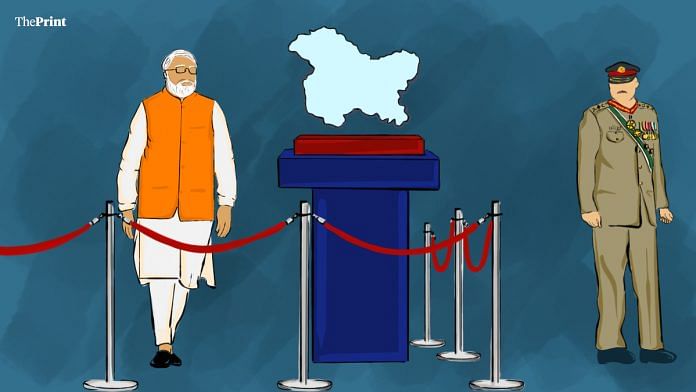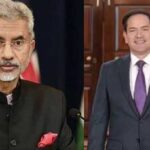Why alarm? Think another date. India was to launch the Vande Bharat Express between Delhi and Srinagar on 19 April, and Prime Minister Narendra Modi was expected.
That the inauguration was postponed because of bad weather is beside the point. Munir did not know this while making his speech. This train, the coming out party of Naya Kashmir, brought in that urgency and desperation.
Things have been stabilising in Jammu & Kashmir over the past three years; a peaceful election has been held with much participation. Normalcy reflects in the tourist numbers steadily rising to 2.95 million in 2024, and estimated to go well over 3.2 million in 2025.
We know how critical peace is for tourism to flourish. It is central to Kashmir’s economy. This is evidenced in the boom in hotel and resort-building across the Valley, and especially in and around Pahalgam. Tourism is only one, and a more visible aspect. If you see this with the , it all pointed to a healing of hearts. For nearly eight decades, Pakistanis had raised the scare of demographic change in the Valley through Indian “settler-colonisation,” or the import of non-Kashmiris. Now, Kashmiris were going and settling all across India.
Any sign of normalcy in the Valley is the Pakistani establishment’s nightmare. This had become more than a mere sign, a writing on the wall. Their expectation of a perpetual rebellion after 5 August, 2019, has been belied. It must’ve been galling for the ‘Kashmir is our destiny’ crowd at the GHQ in Rawalpindi.
It’s been argued, and with some logic and wisdom, that his predecessor General Qamar Javed Bajwa had reconciled with this. He was not the first in the succession of Pakistani military leaders. Several of them took a similarly realistic and mature view. They were all patriotic Pakistanis who firmly believed that it was in the interest of their country to accept the reality and that a better relationship with India would serve their interest better. That’s why he worked the backchannel with India to establish a fairly robust ceasefire on the Line of Control (LoC).
On a 1989 reporting visit to Pakistan, Air Chief Marshal Zulfiqar Ali Khan, who served as the PAF chief between 1974-78, said that “the sooner my country realises that it cannot take Kashmir through means military, diplomatic or political, the better it is for us”. Khan was an honourable, professional soldier who resigned in protest against Zia overthrowing Zulfiqar Ali Bhutto and later served as Pakistan’s ambassador to Washington. This quote was published in my story in the 31 January, 1989 issue of India Today magazine. Since then, we have seen multiple top military commanders make the same point.
Munir, we can now surmise, must have chafed, seeing these as capitulation but also contrary to the spirit of “the already scripted destiny”. Commissioned at the peak of Zia’s power in 1986, he would personify the phenomenon that is sometimes described in the Pakistani debate as “Zia Bharti” (Zia recruits).
It’s been presumed that many of these officers are more Islamist and thereby believers in scriptural destiny. Zia was deeply Islamic too, and a follower of Maulana Maududi. Whether he was also a believer in scriptural destiny, we cannot say. Because he definitely hadn’t imagined what destiny had scripted for him. I do not have enough yet to offer an analysis of his other Corps Commanders. Just that they are all ‘Zia Bharti’ vintage.
He took over power—that’s the expression we safely use for succession in the Pakistani army—in particularly fortuitous circumstances. He was to retire two days before the superannuation of Bajwa. This had put him out of contention for chief. But in an incredible and intrigue-filled twist, the likes of which you can only imagine in Pakistan, he was named chief days before his retirement, probably because he promised to fix Imran. This gave Pakistan that unprecedented distinction of having two serving chiefs for two days.
He’s also unique in that he’s a graduate of Pakistan’s Officers Training School (OTS) and not the more fancied Pakistan Military Academy. In the subcontinental armies, the OTS produces Short Service Commissioned officers who never rise to the rank of chief. Munir is the first. More unexpected twists prepared him for the top job. He was the ISI chief when Pulwama happened. Not long after (having served eight months), Bajwa decided to move him. He was ‘accommodated’ as Corps Commander in Gujranwala. This was a career breakthrough. In Pakistan, to become chief, you must serve as Corps Commander. Fate checked this box for him.
Now that destiny has changed all the rules of humans and installed me in this position, he might have thought, it must have a higher purpose for me. He destroyed all political challenge. He jailed Imran Khan and wife Bushra on multiple serious charges, institutionally fixed the election by having the most popular party (Imran’s Pakistan Tehreek-e-Insaf) from contesting, installing a government thus ‘elected’ without an opposition.
In his coup, without staging one, Munir squashed all other possible challenge by getting a string of amendments railroaded late into the night that pretty much rewrote the Constitution. Important point: it raised the army chief’s tenure from three years to five.
Understanding the human mind is challenging enough for professional psychoanalysts. It is an imprecise science. For a mere journalist, it might even be reckless. If you stack up all of the facts, however, and stay with that “destiny must have a higher purpose for me” mindset, you can translate that 16 April speech better.
Kashmir’s return to normalcy, for him, had to be reversed. Pahalgam wasn’t plotted in the week between the speech and the massacre. It must have taken several weeks, if not months of planning. The choice of personnel, place, method for maximum impact, escape routes, the cover, everything.
Soumya Pillai, who covers science for us, made this curious discovery that private orders on Maxar Technologies for high-resolution satellite pictures of the Pahalgam region rose considerably in February this year. We cannot draw any connection, but a tiny, private Pakistani company became a Maxar partner. It was founded by a dodgy businessman convicted in the past for subverting export rules to get sensitive technologies for Pakistan nuclear agency. Do such coincidences happen? Why would 12 orders be placed with Maxar for Pahalgam pictures in one short month against an average of less than two across the previous 12 months, with none in March?
See it this way. If the plan was ready, as it must have been, it was waiting for the right day. If our reading of Munir is right, the launch of the first-ever direct train service from Delhi (in Munir’s view, India) to Kashmir would be that one big turning point in the Valley’s mood and its integration with India. He had to thwart any cost. Even risking war.








